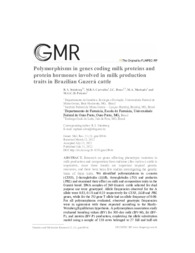Polymorphisms in genes coding milk proteins and protein hormones involved in milk production traits in Brazilian Guzerá cattle.
Polymorphisms in genes coding milk proteins and protein hormones involved in milk production traits in Brazilian Guzerá cattle.
Author(s): STEINBERG, R. S.; CARVALHO, M. R. S.; ROSSE, I. C.; MACHADO, M. A.; PEIXOTO, M. G. C. D.
Summary: Research on genes affecting phenotypic variation in milk production and composition from indicine (Bos indicus) cattle is imperative, since these breeds are important tropical genetic resources, and there have been few studies investigating the genetic basis of these traits. We identified polymorphisms in k-casein (CSN3), b-lactoglobulin (LGB), thyroglobulin (TG) and prolactin (PRL) and examined their effect on milk and composition traits in the Guzerá breed. DNA samples of 260 Guzerá cattle selected for dual purpose use were genotyped. Allele frequencies observed for the A allele were 0.83, 0.18 and 0.25 respectively for CSN3, LGB and PRL genes, while for the TG gene T allele had an allele frequency of 0.09. For all polymorphisms evaluated, observed genotypic frequencies were in agreement with those expected according to the Hardy-Weinberg Equilibrium hypothesis. A polymorphism association study evaluated breeding values (BV) for 305-day milk (BV-M), fat (BV-F), and protein (BV-P) production, employing the allele substitution model using a sample of 139 cows belonged to 27 full and half-sib families of a MOET (multiple ovulation and embryo transfer) selection nucleus. Association was found between the LGB polymorphism and BV-M, BV-F and BV-P. Animals with LGB AA genotype have, on average, higher BV when compared to animals with LGB AB and BB genotypes (277.85 kg for BV-M, 12.09 kg for BV-F and 9.33 kg for BV-P). These findings contribute to a better understanding on the influence of these polymorphisms on milk production traits in Guzerá cattle.
Publication year: 2022
Types of publication: Journal article
Unit: Embrapa Dairy Cattle
Observation
Some of Embrapa's publications are published as ePub files. To read them, use or download one of the following free software options to your computer or mobile device. Android: Google Play Books; IOS: iBooks; Windows and Linux: Calibre.
Access other publications
Access the Agricultural Research Database (BDPA) to consult Embrapa's full library collection and records.
Visit Embrapa Bookstore to purchase books and other publications sold by Embrapa.

